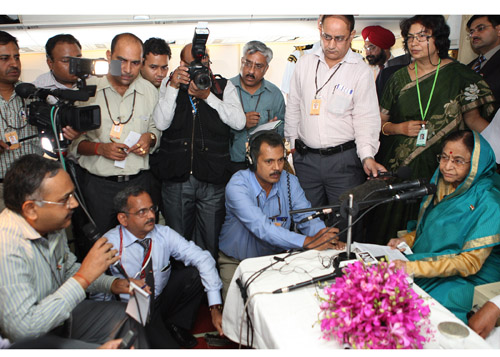Departure Statement on Board by H.e. Smt. Pratibha Devisingh Patil, the President of India on Her State Visits to the Republic of Korea and Mongolia
On Board Special Aircraft : 24-Jul-2011

Ladies and Gentlemen of the Media,
I warmly welcome you on-board, as I begin my State Visits to the Republic of Korea and Mongolia, which are two important partners of India in North East Asia. These countries are key pillars of our Look East Policy, as well as of our growing integration with the Asia - Pacific region. We are linked to both these countries by bonds of culture and civilization. Buddhism spread from India to both these countries many centuries ago. Today, we also share several core values with them. All three countries are democracies, where periodic and fair elections are held, there is adherence to the rule of law, as well as respect for individual freedoms.
Presidents of both these important countries visited India in the last two years, and my visit is a part of the process of high level engagement with these friendly countries. It takes place in a year that is being celebrated as the Year of India in Korea and the Year of Korea in India. Also, this year, Mongolia is observing many important anniversaries of its history.
My first stop will be in Seoul. It would be recalled that President Lee Myung-Bak of the Republic of Korea, was the Chief Guest for our Republic Day celebrations in January 2010. During his visit, India and the Republic of Korea elevated bilateral ties to the level of a Strategic Partnership. My objective will be to accelerate the momentum of our relations.
I look forward to holding discussions with President Lee, both in restricted and delegation-level formats. We will cover the entire gamut of bilateral relations as well as regional and global issues. I will also be meeting Speaker Park of the National Assembly of the Republic of Korea.
Economics is the foundation of the India-Korea relationship. We implemented a Comprehensive Economic Partnership Agreement from January 2010. The results have been encouraging. Two-way trade rose by approximately 40 percent in 2010, and is growing equally fast this year. As per projections, it will reach 21 billion US Dollars in 2011. Korean companies such as LG, Samsung and Hyundai are household names in India. They have done extremely well in our domestic market, and are now using India as a manufacturing base for exports to third countries. We look forward to receiving more Korean investment in our country. Similarly, Indian firms are also investing in Korea.
An Indian business delegation will be in Seoul and Ulaanbaatar during my visit, to explore trade and investment opportunities.
My visit to Mongolia, the first by a President of India in 23 years, aims at signaling the importance we attach to this bilateral relationship, and to further expand and strengthen our ties. We were pleased that after his election, President Elbegdorj made India, the destination of his first foreign visit in September 2009. Our relations were, during that visit, elevated to a Comprehensive Partnership.
In Mongolia, I will hold deliberations with President Elbegdorj on all issues of importance to both countries. I also look forward to meeting Prime Minister Batbold. I will be interacting with Parliamentarians of the State Great Hural, including women politicians.
You may be aware that India has established the Rajiv Gandhi Art and Production School for vocational education in Ulaanbaatar. Similarly, there is the A.B. Vajpayee Centre of Excellence in Information and Communication Technology. India has been, and is committed to, assisting Mongolia in capacity building and human resource development.
It is important to promote people-to-people exchanges with both the Republic of Korea and Mongolia. One of the ways of doing so is by increasing the number of direct flights between our countries. I look forward to discussing this subject with President Lee in Seoul and President Elbegdorj in Ulaanbaatar.
I am confident that my State Visits to the Republic of Korea and Mongolia will further enhance the close partnership that exists between India and these countries.
Thank you.
